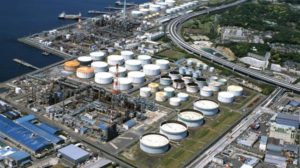Japanese buyers will seek an extension of the waiver from US sanctions on Iranian oil imports after the initial 180-day exemption is over, the Petroleum Association of Japan (PAJ) said on Tuesday.

The United States granted exemptions to Japan and seven other countries on Nov. 5, allowing them to continue buying Iranian oil.
As Japan sees Iran as an important crude supplier, local refiners plan to request the government to secure extension at the earliest, president of Petroleum Association of Japan (PAJ) Takashi Tsukioka told reporters in Tokyo.
Refiners in Japan and South Korea are reportedly looking to resume Iranian oil imports. Tsukioka said first Japan’s shipments are about to take place around end-December. Oil loadings in January-March are likely to be heavy, he added.
Among the importers of Iranian crude is Japan’s second-biggest refiner Idemitsu Kosan which hopes to buy the remainder of its contractual volumes of Iranian oil during the exemption period, said Tsukioka which also serves as the company’s chairman.
Iran’s biggest oil client is China which is also the world’s largest energy consumer. Chinese refiners imported 247,160 barrels per day (bpd) of Iranian oil in October, data cited by Reuters showed.
For the January-October period, imports from Iran fell 3.4 percent from 2017 to 25.54 million tonnes, or 613,300 bpd, it said.
China is allowed to buy 360,000 bpd of oil from Iran for at least 180 days from the imposition of sanctions, but Beijing has pledged to continue Iranian shipments.
For that matter, private companies are likely to follow US instructions but state-owned refiners have signaled to remain non-committal.
China’s crude import demand hit an all-time high in October and is reportedly expected to stay strong to year-end.
A simmering trade dispute between Washington and Beijing over President Donald Trump’s sanctions prompted Chinese firms to stop importing US crude oil around August and September.
Russian exporters rushed in to fill the gap, shipping record volumes of crude oil to China in October.
According to the General Administration of Customs data, about 1.73 million bpd of Russian crude was shipped during the period, up 58 percent from a year earlier.
China is also eyeing to tap Iran’s massive gas resources – the world’s biggest. On Sunday, Iran’s Minister of Petroleum Bijan Zangeneh said China’s state-owned energy giant CNPC has officially replaced Total in a multibillion-dollar South Pars gas project.
“China’s CNPC company has officially replaced Total in phase 11 of South Pars, but it has not started work practically,” he said.
Iran now wants to hold talks with CNPC to determine when it will start its operations, the minister added.
The project is seen to come on stream in 2021 at around 2 billion cubic feet per day of gas and 70,000 barrels per day of condensate.
Total withdrew from the $4.8 billion project earlier this year despite having initially pledged to stand its ground against US sanctions.
The withdrawal will raise CNPC’s stake in the project to around 80 percent, with the remaining 20 percent to be held by National Iranian Oil Company subsidiary PetroPars.
source: Presstv









































